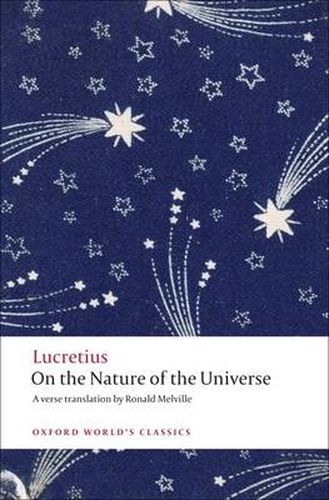Readings Newsletter
Become a Readings Member to make your shopping experience even easier.
Sign in or sign up for free!
You’re not far away from qualifying for FREE standard shipping within Australia
You’ve qualified for FREE standard shipping within Australia
The cart is loading…






“Therefore this terror and darkness of the mind Not by the sun’s rays, nor the bright shafts of day, Must be dispersed, as is most necessary, But by the face of nature and her laws.‘
Lucretius’ poem On the Nature of the Universe combines a scientific and philosophical treatise with some of the greatest poetry ever written. With intense moral fervour Lucretius demonstrates to humanity that in death there is nothing to fear since the soul is mortal, and the world and everything in it is governed not by the gods, but by the mechanical laws of nature. By believing this, men can live in peace of mind and happiness. Lucretius bases his argument on the atomic theory expounded by the Greek philosopher Epicurus. His poem explores sensation, sex, cosmology, meteorology, and geology through acute observation of the beauties of the natural world and with moving sympathy for man’s place in it. Sir Ronald Melville’s accessible and accurate verse translation is complemented by an introduction and notes situating Lucretius’ scientific theories within the thought of 1st century BCE Rome and discussing the Epicurean philosophy that was his inspiration and why the issues Lucretius’ poem raisies about the scientific and poetical views of the world continue to be important.
$9.00 standard shipping within Australia
FREE standard shipping within Australia for orders over $100.00
Express & International shipping calculated at checkout
“Therefore this terror and darkness of the mind Not by the sun’s rays, nor the bright shafts of day, Must be dispersed, as is most necessary, But by the face of nature and her laws.‘
Lucretius’ poem On the Nature of the Universe combines a scientific and philosophical treatise with some of the greatest poetry ever written. With intense moral fervour Lucretius demonstrates to humanity that in death there is nothing to fear since the soul is mortal, and the world and everything in it is governed not by the gods, but by the mechanical laws of nature. By believing this, men can live in peace of mind and happiness. Lucretius bases his argument on the atomic theory expounded by the Greek philosopher Epicurus. His poem explores sensation, sex, cosmology, meteorology, and geology through acute observation of the beauties of the natural world and with moving sympathy for man’s place in it. Sir Ronald Melville’s accessible and accurate verse translation is complemented by an introduction and notes situating Lucretius’ scientific theories within the thought of 1st century BCE Rome and discussing the Epicurean philosophy that was his inspiration and why the issues Lucretius’ poem raisies about the scientific and poetical views of the world continue to be important.